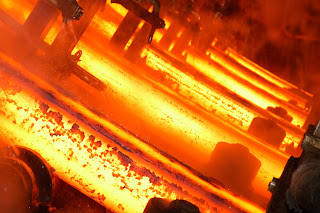 |
| Pyrometers permit temperature measurement without contact |
Pyrometers can commonly concentrate light from an object onto a temperature sensing element. The sensed elevation in temperature is proportional to the infrared optical energy. Different instruments may have varying arrangements of concentrating lenses and sensors, but the operating principle is the same. The physical law behind the pyrometer’s operating principle operates on an exponential mathematical basis that is non-linear. This results in one of the limitations of the pyrometer. A single pyrometer can only, with high accuracy, deliver a comparatively narrow range of target temperature. If the need for accuracy is reduced, the applicable temperature range widens. Innovative manufacturers have developed instruments with technology and features overcoming many of the limitations imposed by the physics, delivering instruments with accuracy and applicable temperature range usable in a wide array of applications.
One of the advantages to using a non-contact pyrometer is that their calibration is independent of the distance between the sensor and the object being evaluated. This phenomenon is due to the fact pyrometers have a field of view and can be filled with the target object in a way independent of distance. While the radiation emanating from the target object may be decreasing, the field of view of the pyrometer is measuring a greater portion of the object which is proportional to the amount of radiation being lost, essentially canceling out the distance and allowing the pyrometer to provide useful output. An example of a practical application of a pyrometer in industry would be its use to check the temperature of a ventilation system in the HVAC field.
Share your temperature measurement requirements and challenges with process instrumentation specialists. Their product application expertise will combine with your own process knowledge and experience to produce an effective solution.
Analynk Wireless manufactures wireless connectivity solutions for industrial applications and process control. Making cable free connections among process control equipment and instruments, across the room, across the property, across the globe.